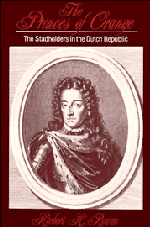Book contents
- Frontmatter
- Contents
- List of illustrations
- Preface
- Prologue: lieutenants of the crown
- 1 William I: from courtier to rebel
- 2 Maurice of Nassau: defender of the Republic
- 3 Frederick Henry: firm in moderation
- 4 William II: the challenger
- 5 The first stadholderless period: 1 exclusion
- 6 The first stadholderless period: 2 return
- 7 William III: stadholder and king
- 8 The second stadholderless period: doldrums
- 9 William IV: neither revolutionary nor reformer
- 10 William V: the era of Anna and Brunswick
- 11 William V: the Patriot challenge
- Epilogue: consequences and conclusions
- Bibliography
- Index
- Title in series
Preface
Published online by Cambridge University Press: 01 June 2011
- Frontmatter
- Contents
- List of illustrations
- Preface
- Prologue: lieutenants of the crown
- 1 William I: from courtier to rebel
- 2 Maurice of Nassau: defender of the Republic
- 3 Frederick Henry: firm in moderation
- 4 William II: the challenger
- 5 The first stadholderless period: 1 exclusion
- 6 The first stadholderless period: 2 return
- 7 William III: stadholder and king
- 8 The second stadholderless period: doldrums
- 9 William IV: neither revolutionary nor reformer
- 10 William V: the era of Anna and Brunswick
- 11 William V: the Patriot challenge
- Epilogue: consequences and conclusions
- Bibliography
- Index
- Title in series
Summary
Political history has usually been studied in two separate ways. One is to look at events, the working out of actual politics; included in this approach is the biography of individual statesmen. The other is to examine institutions, the formal structures and explicit rules that hold sway over the long run. These two approaches have most often been treated as mutually exclusive contraries, and those historians who have been effective in one have seldom been so in the other. Yet, lost in the vast middle ground between them, touching on both but distinct from either, is another kind of political history, the study of informal institutions, which we might also describe as the interplay of events and institutions. The stadholderate in the Dutch Republic was such an institution, embodying formal, informal and (to use the neologism of the Annales historians) événementiel aspects.
Like the Republic of the United Provinces as a whole, the stadholderate was an improvisation that lasted more than two centuries (with two long breaks). Again as with the Republic, it was difficult for contemporaries to fit it into the standard categories of political analysis. Modern political theory does little better, for its slots are carved for different situations. The usual solution has been to describe the stadholdership in terms of monarchy, as crippled and incomplete kingship.
- Type
- Chapter
- Information
- The Princes of OrangeThe Stadholders in the Dutch Republic, pp. ix - xiiPublisher: Cambridge University PressPrint publication year: 1988



